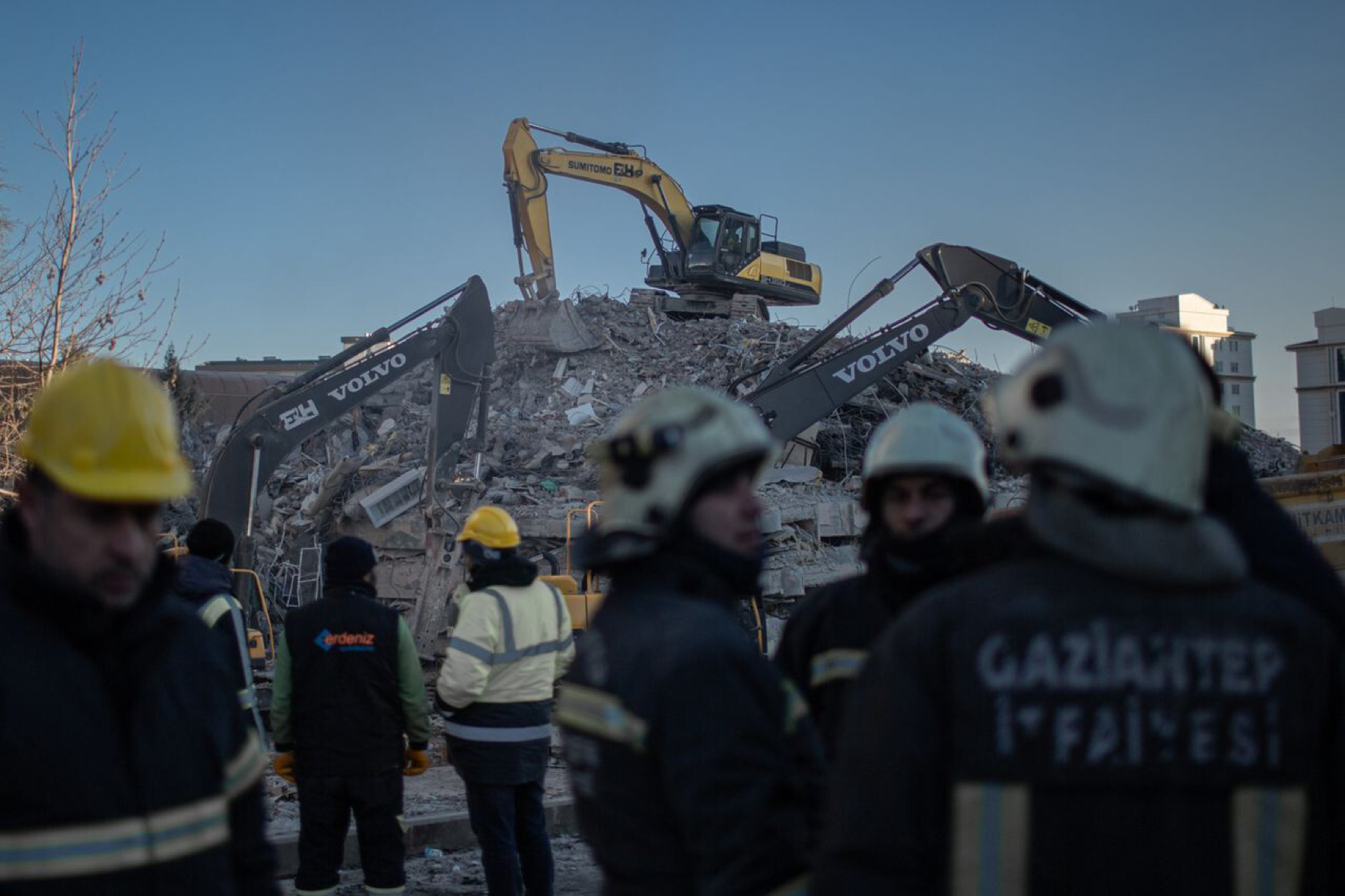More than 200 construction bosses face arrest in Gaziantep and cities across Turkey’s earthquake zone
ANTAKYA, Turkey—Marketed as “a little piece of heaven,” the 12-storey Ronesans Residence apartment complex opened in 2013 and stood until last week as a symbol of this southern city’s rapid urbanization and the two-decade expansion of Turkey’s middle class.
Now the 249-unit development is a tomb and a crime scene after toppling over sideways in a devastating earthquake and trapping hundreds of bodies below. Its developer, Mehmet Coskun, is under arrest. Mr. Coskun, who was detained at Istanbul airport en route to Montenegro, said he obtained all necessary permits and inspections and denied that the building collapsed, telling a prosecutor: “Our building just laid on its side.”
He is one of more than 230 builders, architects and engineers facing legal proceedings amid rising public anger over the collapse of more than 41,000 buildings wrought by last week’s earthquakes. The latest arrests, announced Wednesday, include the owner, architect, civil engineer and project managers of a collapsed business center in Diyarbakir and four people linked to a destroyed hotel in Adiyaman.
Experts, survivors’ families and Turkey’s opposition party say that many apartments built during a two-decade-long housing boom didn’t adhere to regulations for seismic events, despite a series of reforms designed to make buildings stronger after a 1999 earthquake near Istanbul killed at least 17,000 people.
Turkish Vice President Fuat Oktay vowed on Monday to investigate “until the judicial process is concluded” as state media published scenes of suspects being escorted from their homes or offices by police. The Justice Ministry has set up special units to investigate suspects as quickly as possible. At least three contractors were stopped at airport security as they tried to leave the country.
The arrests come amid government efforts to assuage public anger that is being directed at the government of President Recip Tayyip Erdogan, who has spent years consolidating control over Turkey’s institutions after riding to power on frustrations over the state’s response to a 1999 earthquake that killed thousands near Istanbul.
Mr. Erdogan’s government oversaw a building boom across the country, particularly in the president’s strongholds in the conservative Anatolian heartland where last week’s earthquakes were centered. Rising apartment blocks that had epitomized social mobility for an expanding conservative middle class are now a symbol of Turkey’s worst earthquake in nearly a century and questions over standards and regulations.
“I’m not sure the government understands the depth of the anger,” said Soli Ozel, professor at Istanbul’s Kadir Has University. “Arresting the contractors will not be enough. The government is in survival mode, trying to move the public’s attention away from this.”
Anger is also coalescing around a series of construction amnesties granted by the government, most recently in 2018, that allowed constructors and landlords to come forward and avoid punishment for unauthorized buildings or construction that violated building codes, in some cases by paying a fine. The 2018 law put the burden of earthquake-proofing on landlords.
Another amnesty was expected ahead of national elections expected for May that will now determine Mr. Erdogan’s political future. A senior member of the president’s party has called for the vote to be postponed.
The 2018 amnesty was billed at the time as “the compassionate hand extended from the state to the people,” according to a government video. Mr. Erdogan touted it ahead of 2019 local elections at a campaign rally in Kahramanmaras, near the epicenter of one of last week’s earthquakes.
The prospect of another amnesty came despite the World Bank estimating in 2022 that 6.7 million residential buildings in Turkey needed retrofitting or rebuilding to withstand seismic shocks.
Taner Yuzgec, head of the civil engineers chamber in the capital Ankara, said zoning amnesties, by legally registering illegal construction without first resolving code violations, had put buildings at greater risk during earthquakes by allowing changes to buildings that affect how the structures move in response to seismic activity.
As a result, more than 7 million independent units in Turkey that aren’t constructed in line with building, fire and seismic codes have been registered, according to Burga Gocke, a city planner for Istanbul. That left many people living in buildings constructed with rusty and inadequate amounts of iron or with iron rods not connected to each other in columns, using sea sand, with too thin columns, or built by people with no engineering background, he said.
“In practice, this law weakened the efforts to change the current building stock to a more secure and reliable one,” he said. “Unfortunately we have seen the results in the field after the earthquake in Kahramanmaras.”
Turkey’s government didn’t respond to a request for comment. Mr. Erdogan said in a televised speech Tuesday that 98% of the buildings destroyed in the earthquakes were built before 1999, a claim that couldn’t be verified.
The collapse of so many buildings across a 250-mile area around the same size as Wisconsin shows that Turkey’s two-decade construction-fueled boom was built on shaky foundations.
The sprawling six-tower Ayse-Mehmet Polat apartment complex in Gaziantep collapsed as soon as the earth began shaking on Feb. 6. Days later, prosecutors combed through the rubble alongside earthmovers removing concrete and tangles of iron rebar. The families whose loved ones are underneath gathered across the street, demanding answers.
Mehmet Zavarci moved from the village of Ibrahimli into a building opposite the Polat residence, joining a host of relatives and friends who had already moved into the complex—part of a mushrooming middle class that emerged as Turkey’s economy quadrupled in the decade to 2013.
“Residents bought these homes for what they thought was their strength,” said Mr. Zavarci, who works as a caterer.
When the first earthquake hit before dawn, Mr. Zavarci gathered his wife and three children from their beds and rushed down the stairs. By the time they emerged into the freezing night, four of the six buildings had already collapsed.
“All we saw was dust,” said Mr. Zavarci, 38.
In the first five days after the earthquake, only 15 people were pulled from the rubble alive.
“It’s about money,” Mr. Zavarci said. “Money, money, money.”




